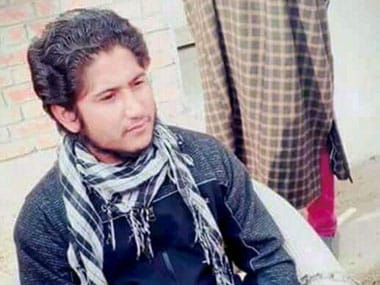Srinagar: Often considered as an apt fulfilment of the void created by the killing of Lashkar-e-Taiba’s well-known Kashmir face Abu Dujana, the elimination of Naveed Jatt alias Abu Hanzullah alias Munnu alias Chotu on Wednesday has created the vacuum yet again for the terror outfit.
[caption id=“attachment_4356553” align=“alignleft” width=“380”]  File image of Naveed Jaat. PTI[/caption] On Wednesday, Jatt was killed in Chatergam area of Budgam district early morning when a team of Rashtriya Rifles, Kashmir Police and CRPF cordoned off the house he was trapped in. He was one among the two militants killed during the gunfight that ensued. Two soldiers were also injured in the encounter. “He was operating for many years in the Valley. It is a big achievement since it was on his instructions so many atrocities were committed against civilians. He also forced young boys into militancy,” said Jammu and Kashmir, Director General of Police, Dilbag Singh. The son of a Multan trucker in Pakistan, Jatt was LeT’s deputy chief at the time of his arrest in 2014, which was termed as a “major” breakthrough by the forces. He was booked in FIR No 42/2014 under sections 302 of the Ranbir Penal Code (RPC) and Section 27 Arms Act and Section 14 of The Foreigners Act. “He was involved in the killing of an ASI in Pulwama and a CRPF man in 2013,” police record reveals. “He was also involved in another attack in which five policemen and two civilians were seriously injured. Besides, he has also been involved in many rifle snatching attempts.” A police officer who interrogated Jatt in 2014 terms him as the “trained to the hilt” combatant, “who could have killed anyone with his bare hands”. Jatt spent most of his time in Kashmir emphasising on Jihad but his mission was cut short when he was arrested in 2014 from Shopian by Kulgam police. But Jatt’s boy-faced simplicity simply betrayed his ruthlessness as a militant in Kashmir’s new age militancy, which was ably sparked by many Pakistan-based militants, some of whom later became poster boys. After Abu Qasim and Abu Dujana, Naveed Jatt was the familiar face from “the other side” active in the Valley. It was his dramatic escape from the police custody early this year on 6 February that created sensational headlines. Not only he escaped from Srinagar’s SMHS Hospital, but he also ended up killing two constables. Perhaps, in post-2010 Kashmir insurgent history, Jatt’t escape easily fared as the most rattling insurgent event. And even before the police would activate its men and machinery to nab him, he was well-placed in Kashmir’s deep south, where he clicked pictures with Hizb’s former charismatic commander, Saddam Padder. “His killing is a shot in the arm for us,” said a top police officer. “Problem is militants of his sway and stature work like catalysts in Kashmir. They motivate young impressionable boys to pick up arms and go for the suicidal trip.” In the busy world of counterinsurgency in Kashmir, the likes of well-trained militant like Jatt are often passed as “some competition” as compared to his ill-trained and ill-equipped Kashmiri counterparts. And therefore his killing is being termed as “a departure” from the routine killing of local militants in Kashmir. After top LeT commander Azad Malik’s recent killing in an encounter in Anantnag, Jatt is the second prime accused in Bukhari’s assassination to be killed. Bukhari was leaving his office in Srinagar, when three assailants riding on a motorcycle shot him and his two bodyguards on 14 June this year. Despite being named by the police as the editor’s assassin, Jatt’s popularity as a militant grew with his regular gun-salute appearances on militant funerals. A close aide to Abu Qasim, Jatt was operating in the Valley since 2012. He had infiltrated into Kashmir along with seven other militants between October and November that year. “They entered through Athmuqam Farkian area in Kupwara sector,” a police report said. “Jatt and 22 other terrorists hid in Bandipora jungle for over six months between December 2012 and May 2013 before he was sent to Pulwama along with Ashiq Lone, another militant. They were equipped with mobile phones and SIM Cards, and taught how to contact Pakistan-based terrorist leaders through Skype,” the report said. Charged under the Arms Act, Jatt was initially lodged in the Kathua jail, before shifted to Srinagar Central Jail in 2017. During interrogation, Jatt had confessed to being trained at the LeT headquarters of Muridke besides Muzaffarabad. “He even confessed to his meeting with Mumbai attacker Ajmal Kasab at a training camp,” a police officer said. “Now, with his killing, the Pakistan-based terror outfits have lost their poster boy in Kashmir.”


)

)
)
)
)
)
)
)
)



